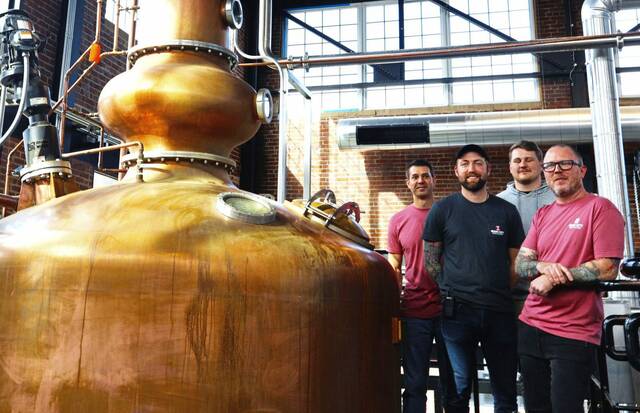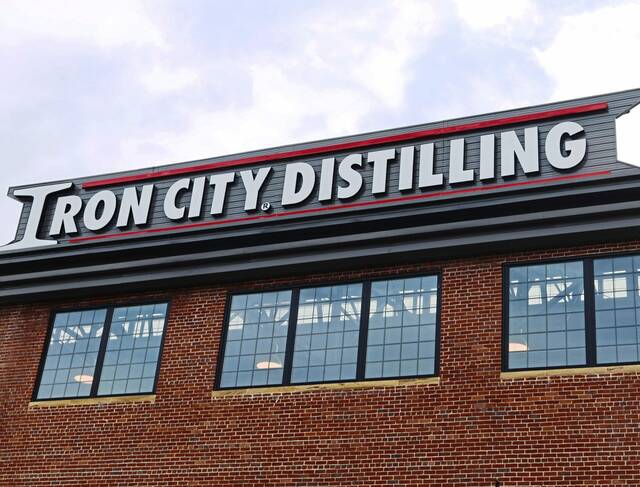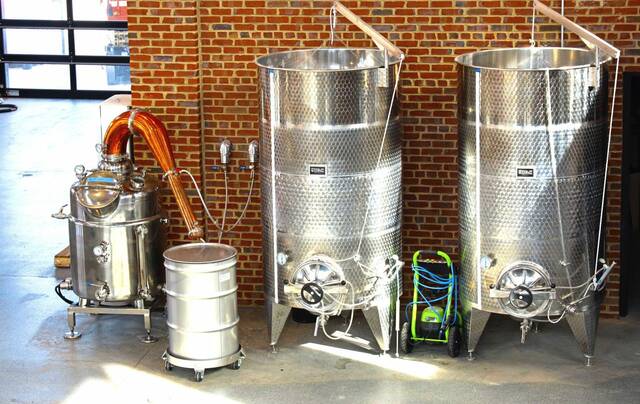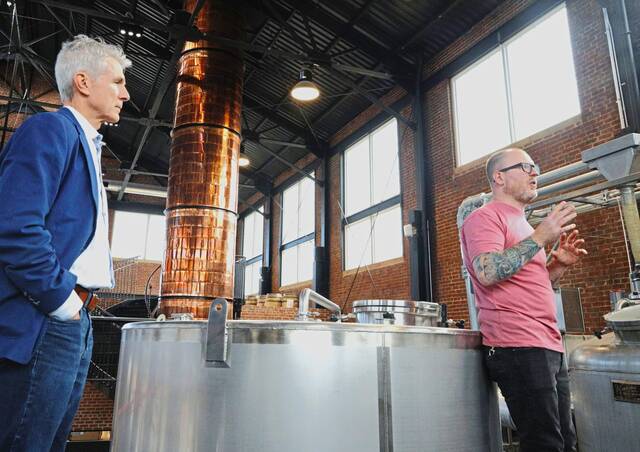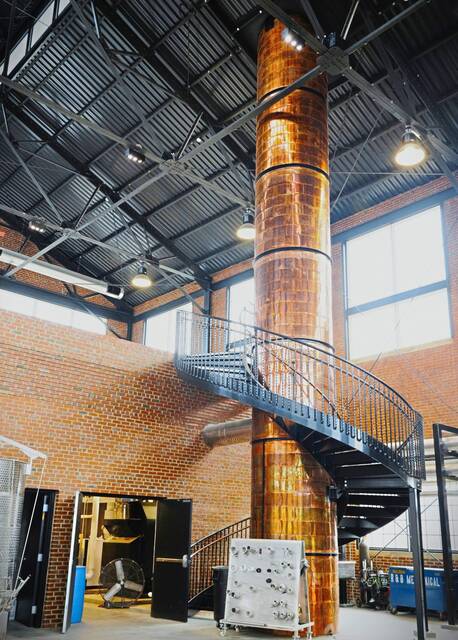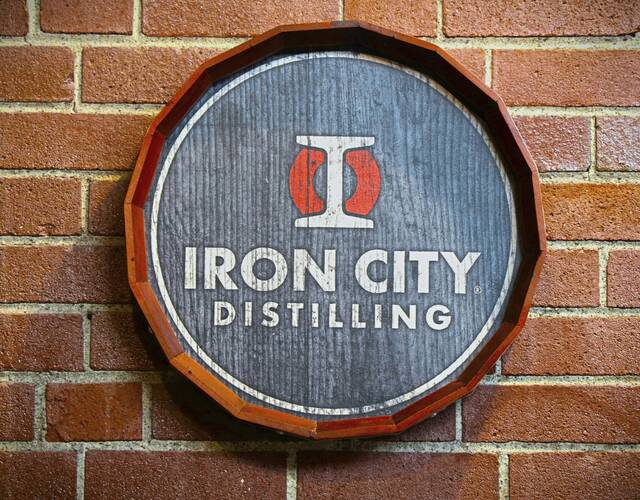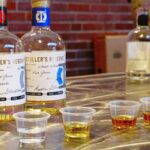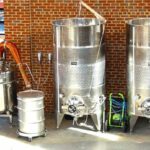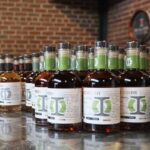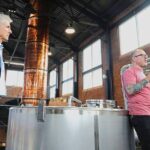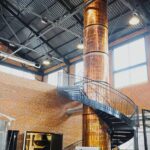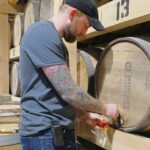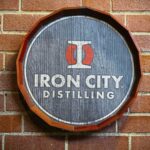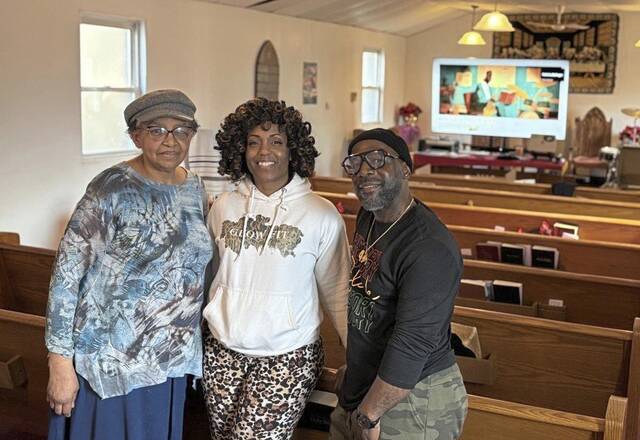Pittsburgh has long been known as a shot-and-a-beer town.
And for more than 160 years, much of the beer consumed here was made by Pittsburgh Brewing Co.
Now the iconic company is making the shots to go with its beer.
After years of sitting in oak barrels until just the right flavor profile was achieved, the first batches of whiskey are being bottled at Iron City Distilling in East Deer, adjacent to its brewing facility off Freeport Road.
The approach to distilling rye whiskey is a significantly slower, hands-on process that doesn’t result in a finished product for several years, said Master Distiller Matt Strickland.
The 170,000-square-foot brewery is on the site of PPG’s former Pittsburgh Glass Works along Ferry Street in the township’s Creighton neighborhood. The PPG plant closed in 2018. The distillery is in the plant’s former boiler room.
Related:
• 9.27.2023. 5th-generation brewer gets 'memory for a lifetime' making Iron City in East Deer• 9.8.2022. Pittsburgh Brewing Co. settles into its state-of-the-art new home of Iron City Beer in East Deer
• 10.9.2021.East Deer, surrounding communities excited for new Iron City Beer building
• 2.3.2021. Pittsburgh Brewing Co. to build brewery at former PPG glass plant in East Deer
While some new technology is used in the distillery, Strickland, 42, and his crew of three men are aiming to replicate a spirit that was produced in Pittsburgh around 1875, which was considered the peak for whiskey production in Western Pennsylvania.
Strickland said the distillery is producing what it has dubbed “Monongahela rye whiskey,” which is made from grain sourced from local farms that grow rye using heirloom seeds.
Local sources also are tapped for the small batches of bourbon, rum and gin produced at the distillery.
“We try to get as much stuff from Pennsylvania as we possibly can,” he said. “Even the bottles we’re using are being made by Stoelzle Glass in Monaca, which is one of the only custom glass manufacturing plants in the United States.”
Pittsburgh Brewing President Todd Zwicker said the focus on sourcing ingredients locally has resulted in a distillery that is “farm-to-flask.”
In addition to taking an artisan approach to distilling whiskey in small batches, Iron City stores its barrels of whiskey at 70 degrees or higher.
Most of the national distillers of whiskey store their product in unheated warehouses, which can negatively affect the quality of the finished product, Strickland said.
New whiskey actually 6 years old
The barrels of whiskey being tapped now were made about six years ago by Strickland at a distillery in Washington, D.C., that went out of business.
“Unlike whiskey, if a brewery goes under, the product literally goes down the drain because it spoils,” he said. “While we’re not interested in sourcing whiskey from other distilleries, I was kind of disappointed that the whiskey I made in D.C. was never released. So it was pretty cool to be able to get hold of some and bring it up here.”
Strickland said the whiskey, rum and and gin brought back from Washington, D.C., is a premium product being sold as Distiller’s Reserve. He said that while the liquors taste great, “I’m a much better distiller now than I was six years ago.”
Iron City Distilling has about 150 barrels of whiskey that are ready for bottling and about 500 barrels that have been filled but won’t be ready to be tapped for several years. Each barrel holds 53 gallons of whiskey.
The distillery is in the process of adding additional capacity that will enable it to produce as many as 4,500 barrels of whiskey a year.
While the initial focus will be on selling whiskey direct to the public and hosting events at the brewery, it eventually will be available in state liquor stores and other outlets.
The distillery has a cafe and is in the process of building a performance venue.
In the coming months, the distillery plans to add a “three-chamber still” to produce its whiskey, which is how it was done in the 1800s.
When it’s installed next year, it will be the only one in Pennsylvania and among only a handful in the U.S., according to Strickland.
Most distilleries in the U.S. no longer use three-chambered stills because they are labor intensive. But Strickland said they are willing to do the extra work because that type of still is ideal for making rye whiskey.
Even the time it takes for the rye mixture to ferment is extended to improve flavor, he said. Rather than the typical 72 hours, the mixture that eventually will be turned into whiskey is allowed to ferment for 96 hours.
Pennsylvania whiskey historian Sam Komlenic, who writes about the state’s whiskey trade, said he was impressed by the effort Iron City is putting into creating a distinctive whiskey.
“This is a phenomenal addition to the state,” he said. “It’s such a great idea to study how it was made in the 1800s and, as best you can, do things exactly the same way.”



